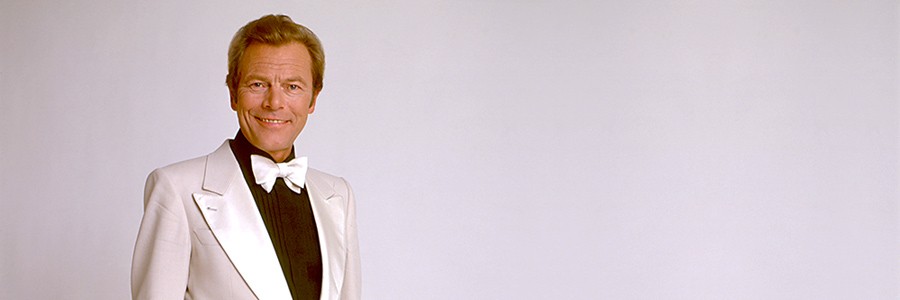Blog Archives
CD3 Bert Kaempfert & His Orchestra »Tribute To The Stars«
CD2 Bert Kaempfert & His Orchestra »Goes To The Movies«
CD1 Bert Kaempfert & His Orchestra »Around The World«
Today & Yesterday – The Bert Kaempfert Anthology (5CD Book)
Limited Deluxe Edition
(German/English)
In honour of Bert Kaempfert 40 years afer his death, we are now releasing »Today & Yesterday – The Bert Kaempfert Anthology« in three formats, as a 5CD book in LP format, as a double CD and in a double vinyl edition.
The lavishly designed 52-page book in LP format combines texts and images to provide an innovative and comprehensive insight into the unique career of this great musician.The Earbook contains 5 CDs with 99 tracks in a special compilation illustrating the versatility of this composer, arranger and sound creator.
The Kaempfert Touch
The “Kaempfert Touch” – this term stands for that “certain something” with which Bert Kaempfert laced his music: attractive melodies, elaborate arrangements combining various instruments to produce a soft and gentle sound, the chorus treated in an orchestral manner, mellow trumpets or other solo instruments, a unique rhythm – and all that conducted by a man who knows how to get his musicians to play in a very special and distinctive manner.
This special “touch” is not only found in compositions by the Kaempfert/Rehbein team, but is also used to enhance works by other composers, as is admirably demonstrated by the album THE KAEMPFERT TOUCH, recorded in October 1969 in Hamburg and released at the beginning of 1970. Alongside original Kaempfert/Rehbein numbers such as the dramatic We Can Make It, Girl (which was performed by Malcolm Roberts among others), the truly swinging Headin’ Home, the romantic waltz One Day With You or the lively bossa nova All For You, there is a wealth of hits and mega-hits from 1969: Something, which Frank Sinatra regarded as “the greatest love song of the past 50 years”, is taken from the Beatles album “Abbey Road” (then brand new), for which the Fab Four received a gold disc; Shirley Bassey’s version also landed in the hit parades at the time. Today this song is available in over 150 cover versions – and Bert Kaempfert’s is one of them.
Didn’t We was written by Jim Webb, the composer of pop classics such as Up, Up And Away and By The Time I Get To Phoenix. It was a further success for the actor Richard Harris, who had discovered his musical talents in the role of King Arthur in the film version of the musical “Camelot”; Webb’s melodramatic MacArthur Park had been a previous hit for the actor.
America’s most successful female group of all time, the Supremes, shot yet again to the top of the charts with Someday We’ll Be Together; Diana Ross, the lead singer, took her leave of the soul trio with this song to start an extremely successful solo career.
Alongside such illustrious pop songs, illustrious film melodies must take their rightful place, and so two such numbers – rivals for an Oscar in 1969 – can also be heard here. While Rod McKuen’s Jean from the film “The Prime of Miss Jean Brodie” had to be satisfied with the honor of being nominated, Burt Bacharach’s Raindrops Keep Fallin’ On My Head from “Butch Cassidy And The Sundance Kid”, filmed with Paul Newman and Robert Redford and a success all the world over, was awarded the coveted trophy. B. J. Thomas’s vocal version stormed to the top of the charts and was one of the greatest successes of the year, bringing him a gold disc. The number has since firmly established itself as one of the best known evergreens.
Bert Kaempfert’s sound engineer Peter Klemt was awarded a diploma by the National Academy of Recording Arts and Sciences for the nomination of the album THE KAEMPFERT TOUCH as “Best Engineered Recording (Non-Classical)”, a further testimony to the internationally recognized high quality of Kaempfert recordings.
Free And Easy
Available for the first time on CD, this album, recorded in the spring of 1970, was Bert Kaempfert’s last production in “classical” two-track stereo before he began using the eight-track system for his recordings.
Once again he and his orchestra made music which was truly “free and easy” in every way, and indeed nothing compares with Kaempfert’s music: in arranging the carefully chosen pieces for his orchestra, he always ensured that the melody remained in the foreground. In addition to the highly popular Sweet Caroline, a top-ten hit written by Neil Diamond, Bert Kaempfert also looked back to that old jazz favorite Gone With The Wind from 1937, and to two world-famous film melodies: Over The Rainbow, which was sung by Judy Garland in the 1939 film musical “The Wizard Of Oz” and which became her signature tune for the rest of her life, and Laura from the 1944 crime film bearing the same name, which brought the film composer David Raksin lasting fame.
Two of the eight original compositions by the Bert Kaempfert/Herbert Rehbein team also originate from a film: “You Can’t Win ’Em All”, starring Tony Curtis and Charles Bronson, was an adventure film made in 1969 whose action took place in the Ottoman Empire after the First World War. With the music to this film – the majestic Love Theme and the action-packed Flight To Mecca that can be heard here –, Bert Kaempfert once again broke his resolution never to write a soundtrack again, something he had sworn after the strenuous work on the film “A Man Could Get Killed” which involved writing a melody which was later to become a hit all over the world: Strangers In The Night.
